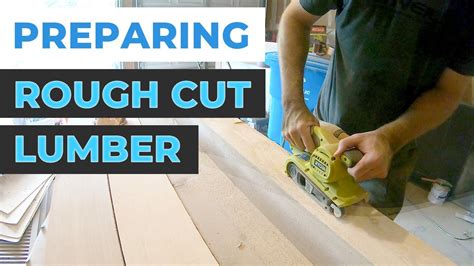How To Treat Rough Cut Lumber For Indoor Use
Ronan Farrow
Apr 02, 2025 · 3 min read

Table of Contents
How to Treat Rough Cut Lumber for Indoor Use
Rough cut lumber offers a rustic charm that's hard to resist, perfect for adding character to your indoor projects. However, it requires specific treatment before use to ensure its longevity and safety. This guide will walk you through the essential steps to prepare your rough lumber for indoor applications.
Assessing Your Lumber
Before you begin any treatment, carefully assess the lumber's condition. This crucial first step will determine the best course of action.
Inspect for Defects
Look for:
- Warping: Significant warping can be difficult to correct, and may render some pieces unusable.
- Checks and Cracks: These can weaken the wood and should be considered when planning your project.
- Knots: While adding to the rustic appeal, large or loose knots may present structural weakness.
- Insect Infestation: Check for signs of borers or other insects. Infested lumber requires specialized treatment.
- Moisture Content: High moisture content is a major concern for indoor use, leading to warping, shrinking, and mold.
Determining Wood Species
The type of wood significantly influences treatment choices. Hardwoods generally require less maintenance than softwoods, but both need preparation before indoor use.
Preparing Rough Cut Lumber for Indoor Projects
Once you've assessed your lumber, you can move onto the preparation stage.
Drying the Lumber
Proper drying is crucial. Kiln-dried lumber is ideal, but if you have air-dried lumber, ensure it reaches an appropriate moisture content (around 6-8% for most indoor applications). This may involve further drying using a dehumidifier or allowing it to acclimatize in your home's environment for several weeks.
Planing and Smoothing
Rough cut lumber, as the name suggests, is rough! Use a planer or hand plane to smooth the surfaces, achieving a more refined finish. This also removes any splinters or imperfections that could cause injury.
Sanding
After planing, sanding is essential for a smooth and even surface. Start with coarser grit sandpaper and gradually move to finer grits to achieve the desired smoothness.
Treating for Durability and Protection
Now that your lumber is prepared, let’s discuss protecting it.
Sealing and Finishing
Applying a sealant or finish protects the wood from moisture, insects, and wear and tear. Many options exist, each offering different benefits:
- Polyurethane: A popular choice offering excellent durability and water resistance.
- Shellac: Provides a beautiful, natural finish, but is less durable than polyurethane.
- Oil-based finishes: Penetrate the wood, enhancing its natural beauty and offering some protection.
- Water-based finishes: Easier to clean up and often less toxic than oil-based options.
Important Note: Always follow the manufacturer's instructions for application and drying times. Proper ventilation is crucial when working with finishes.
Considering Specific Projects
The treatment will also depend on its intended use. For example, furniture requires a more robust finish than shelving. Consider the level of wear and tear the lumber will endure.
Conclusion
Treating rough cut lumber for indoor use involves several steps to ensure its durability and longevity. By carefully assessing your lumber, drying it properly, and applying a suitable finish, you can create beautiful and long-lasting indoor projects. Remember to prioritize safety and always follow manufacturer instructions when handling tools and finishes.
Featured Posts
Also read the following articles
| Article Title | Date |
|---|---|
| How To Remove Chevy Emblem From Tailgate | Apr 02, 2025 |
| How To Strip Chrome From Plastic | Apr 02, 2025 |
| How To Sell Spirits | Apr 02, 2025 |
| How To Remove Limescale From Granite | Apr 02, 2025 |
| How To Teach Soccer | Apr 02, 2025 |
Latest Posts
Thank you for visiting our website which covers about How To Treat Rough Cut Lumber For Indoor Use . We hope the information provided has been useful to you. Feel free to contact us if you have any questions or need further assistance. See you next time and don't miss to bookmark.
